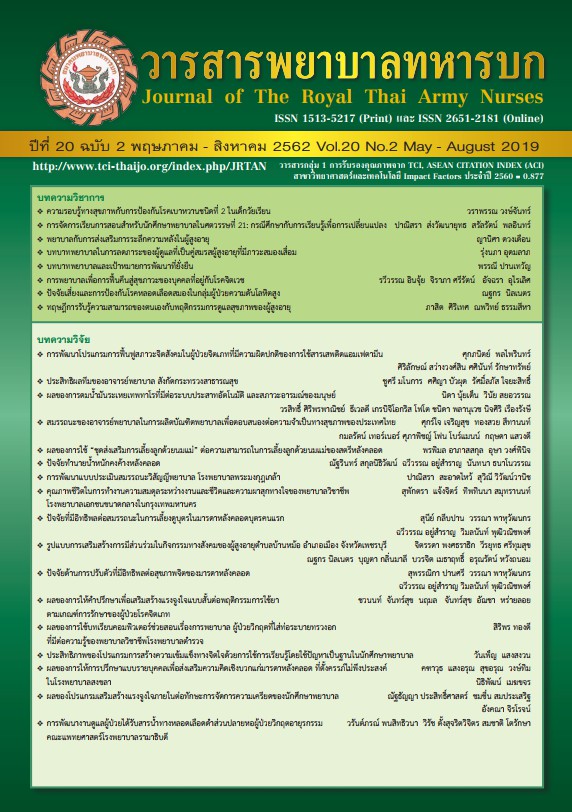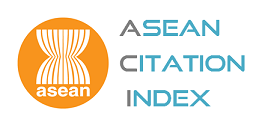คุณภาพชีวิตในการทำงานความสมดุลระหว่างงาน และชีวิตและความผาสุกทางใจของพยาบาลวิชาชีพ โรงพยาบาลเอกชนขนาดกลางในกรุงเทพมหานคร
คำสำคัญ:
คุณภาพชีวิตในการทำงาน, ความสมดุลระหว่างงานและชีวิต, ความผาสุกทางใจบทคัดย่อ
การวิจัยครั้งนี้มีวัตถุประสงค์เพื่อศึกษา 1) ความสัมพันธ์ระหว่างคุณภาพชีวิตในการทำงานและความสมดุลระหว่างงาน และชีวิตกับความผาสุกทางใจของพยาบาลวิชาชีพ และ 2) ปัจจัยที่สามารถร่วมกันพยากรณ์ความผาสุกทางใจของพยาบาลวิชาชีพ โรงพยาบาลเอกชนขนาดกลางในกรุงเทพมหานคร กลุ่มตัวอย่างที่ใช้ คือ พยาบาลวิชาชีพโรงพยาบาลเอกชนขนาดกลางใน กรุงเทพมหานคร จำนวน 296 คน การเก็บรวบรวมข้อมูลใช้แบบสอบถามซึ่งประกอบด้วย 4 ส่วนคือ ปัจจัยส่วนบุคคล คุณภาพชีวิต ในการทำงาน ความสมดุลระหว่างงานและชีวิตและความผาสุกทางใจ สถิติที่ใช้ ได้แก่ ค่าสัมประสิทธิ์สหสัมพันธ์ของเพียร์สัน และ การวิเคราะห์การถดถอยพหุคูณแบบขั้นตอน ผลการวิจัยพบว่า 1) คุณภาพชีวิตในการทำงานและความสมดุลระหว่างงานและชีวิตด้านงานและชีวิตส่วนตัวส่งเสริม ซึ่งกันและกันมีความสัมพันธ์ทางบวกกับความผาสุกทางใจ ความสมดุลระหว่างงานและชีวิตด้านงานแทรกแซงชีวิตส่วนตัวและด้าน ชีวิตส่วนตัวแทรกแซงงานมีความสัมพันธ์ทางลบกับความผาสุกทางใจของพยาบาลวิชาชีพ และ 2) คุณภาพชีวิตในการทำงานด้าน ความก้าวหน้าและความมั่นคงในงานและด้านสังคมสัมพันธ์ ความสมดุลระหว่างงานและชีวิตด้านชีวิตส่วนตัวแทรกแซงงานและ ด้านงานและชีวิตส่วนตัวส่งเสริมซึ่งกันและกัน สามารถร่วมกันพยากรณ์ความผาสุกทางใจของพยาบาลวิชาชีพโรงพยาบาลเอกชน ขนาดกลางในเขตกรุงเทพมหานครได้ ร้อยละ 36.20 อย่างมีนัยสำคัญทางสถิติที่ระดับ .01
Downloads
เอกสารอ้างอิง
2. Siriporn C. et al. Happiness and Professional Attachment amongst Thai Registered Nurses. Thai Journal of Nursing Council. 2012; 27(4): 26-42. (in Thai)
3. Van Horm J. E. et al. The structure of occupational well-being: A study among Dutch teachers. Journal of Occupational and Organizational Psychology. 2004; 77: 365-375.
4. Ryff C. D. and Singer B. Psychological well-being: meaning, measurement, and implications for psychotherapy research. Psychother Psychosom. 1996; 65: 14-23.
5. Wright T. A. and Bonett D. G. Job satisfaction and psychological well-being as nonadditive predictors of workplace turnover. Journal of Managemen. 2007; 33(2): 141-160.
6. Rethinam G. S. and Ismail M. Constructs of quality of work life: A perspective of information and technology professionals. European Journal of Social Sciences. 2008; 7: 58-70.
7. Igbinomwanhia O. R. and Iyayi O. Employee work-life balance as a HR imperative. An International Multidisciplinary Journal. 2012; 6(3): 109-126.
8. Burke R. J. Do managerial men benefit from organizational values supporting workpersonal life balance? Women in Management Review. 2000; 15(2): 81-89.
9. Cummings T. G. and Worley C. G. Organizational Development and Change. 6th ed. Ohio: South-Western College Publishing. 1997.
10. Fisher M. G. et al. Modeling the Relationship between Work Life Balance and Organizational Outcomes. Paper Presented at the Annual Conference of the Society for Industrial-Organizational Psychologica April 21, Orlando. 2003.
11. Zulkarnain A. The mediating effect of quality of work life on the relationship between career development and psychological well-being. International Journal of Research Studies in Psychology. 2013; 2(3): 67-80.
12. Fujishiro K. Fairness at Work: Its Impacts on Employee Well-Being. Doctor of Philosophy Thesis in Partial Fulfillment, The Ohio State University. 2005.
13. Kalyakorn K. and Ganjana C. Factors Related Working Affected on Psychological Well-being of the Employees in The Government Savings Bank Region 8. Khon Kean University Research Journal 2010; 10(3): 135-144. (in Thai).
14. Nielsen K. et al. The effects of Transformational leadership on followers’ perceived work characteristics and psychological well-being: A longitudinal study.Work & Stress: An International Journal of Work, Health and Organizations. 2008; 22(1): 16-32.
15. Rahim N. B. and Siti-Rohaida M. Z. Protean career orientation and career goal development: Do they predict engineer’s psychological well-being? Procedia-Social and Behavioral Sciences. 2015; 172: 270-277.
16. Segrin C. and Taylor M. Positive interpersonal relationships mediate the association between social skills and psychological well-eing. Personality and Individual Differences. 2007; 43(4): 637-646.
17. Van Der D. M., Ali A. J., and Salome E. Role interference and subjective well-being among expatriate families. European Journal of Work and Organizational Psychology. 2005; 14(3): 239-262.
18. Rani A. and Darolia C. R. Work-family interference and well-being in indaian woman: Mediating role of emotional intelligence. Journal of the Indian Academy of Applied Psychology. 2011; 37: 26-33.
19. Sprung J. M. Farming and Work - Family Facilitation: An Examination of Positive Spillover and Crossover Effects among a Sample of Farm Couples. Doctor of Philosophy thesis partial fulfillment, Bowling Green State University. 2013.
ดาวน์โหลด
เผยแพร่แล้ว
รูปแบบการอ้างอิง
ฉบับ
ประเภทบทความ
สัญญาอนุญาต
บทความหรือข้อคิดเห็นใดใดที่ปรากฏในวารสารพยาบาลทหารบกเป็นวรรณกรรมของผู้เขียน ซึ่งบรรณาธิการหรือสมาคมพยาบาลทหารบก ไม่จำเป็นต้องเห็นด้วย
บทความที่ได้รับการตีพิมพ์เป็นลิขสิทธิ์ของวารสารพยาบาลทหารบก
The ideas and opinions expressed in the Journal of The Royal Thai Army Nurses are those of the authors and not necessarily those
of the editor or Royal Thai Army Nurses Association.







